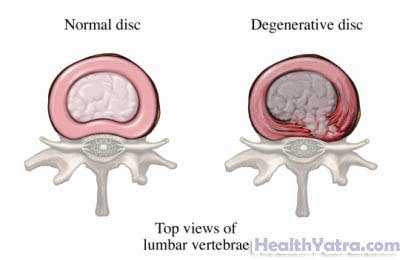Definition
Disks lie between the spinal bones (vertebra). They serve as shock absorbers. This protects the spine and helps it stay flexible. Degenerative disk disease is wear and tear on these disks. This wear and tear causes pain and other symptoms. Some degeneration is normal as you age. Not all degeneration will result in symptoms of this disease.

Causes
The disk is usually dehydrated, and not as resilient as normal. The fibrous tissue, which holds the disk material in place, may suffer small tears. These tears lead to further damage. There is some evidence that genetics may play a part for some people.
Risk Factors
Factors that may incerase your chance for degenerative disk disease:
- Increased age
- Family history of degenerative disk disease
- Athletic activity
- Back injury
Symptoms
Symptoms of degenerative disk disease include:
- Pain in the low back, buttocks, thighs, or neck
- Pain that worsens when sitting, bending, lifting, or twisting
- Pain that feels better when walking, changing positions, or lying down
- Periods of severe pain that gets better after a few days or months
- Numbness and tingling into the legs
- Weakness in the legs
- Foot drop (inability to raise the foot at the ankle)
Diagnosis
Your doctor will ask about your symptoms and medical history. A physical exam will be done. Other tests may include:
- Blood and/or urine tests to rule out other causes of pain
- MRI scan —a test that uses magnetic waves to make pictures of structures inside the body
- X-ray —a test that uses radiation to take a picture of structures inside the body, especially the bones
- Discography —dye is injected into the affected spinal area to get clearer x-ray images
- EMG/NCV-a neurophysiologic test used in some cases to evaluate nerves which may be irritated or impinged on by a disk.
Treatment
Talk with your doctor about the best plan for you. Treatment options include:
Physical Therapy
Therapy for this condition is focused on teaching you how to manage your back pain. This may involve:
- Posture training
- Exercise
- Ice packs
- Heating
- Electrical stimulation
- Relaxation
- Other forms of physical therapy
Injections
Steroid injections may be used for some short term pain relief. They are injected around the nerves exiting the spinal cord.
Surgery
Surgery may be required for some. Surgery may involve removing the degenerated disk and fusing two of the vertebra together.
Prevention
Take the following steps to help protect your spine:
- Begin a safe exercise program with the advice of your doctor.
- Maintain a healthy weight.
- If you have osteoporosis, follow your doctor’s instructions for treating the condition.
Keywords :
Degenerative Disk Disease Definition, Degenerative Disk Disease Causes, Degenerative Disk Disease Symptoms, Degenerative Disk Disease Complications, Degenerative Disk Disease Surgery Cost in India, Degenerative Disk Disease Treatment Hospital in India, Degenerative Disk Disease Treatment in India, Degenerative Disk Disease Doctors in India, Degenerative Disk Disease Meaning in Hindi, Degenerative Disk Disease Meaning in Bengali, Degenerative Disk Disease Meaning in Arabic, Degenerative Disk Disease Treatment cost in 2024, degenerative disc disease, things to avoid with degenerative disc disease, degenerative disease, how i cured my degenerative disc disease, degenerative disc disease treatment, degenerative disc disease symptoms, dd medical diagnosis, history of degenerative disc disease icd 10,
